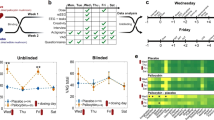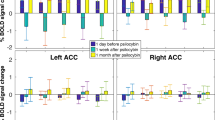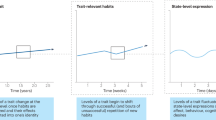Abstract
Humans expect positive events in the future even when there is no evidence to support such expectations. For example, people expect to live longer and be healthier than average1, they underestimate their likelihood of getting a divorce1, and overestimate their prospects for success on the job market2. We examined how the brain generates this pervasive optimism bias. Here we report that this tendency was related specifically to enhanced activation in the amygdala and in the rostral anterior cingulate cortex when imagining positive future events relative to negative ones, suggesting a key role for areas involved in monitoring emotional salience in mediating the optimism bias. These are the same regions that show irregularities in depression3, which has been related to pessimism4. Across individuals, activity in the rostral anterior cingulate cortex was correlated with trait optimism. The current study highlights how the brain may generate the tendency to engage in the projection of positive future events, suggesting that the effective integration and regulation of emotional and autobiographical information supports the projection of positive future events in healthy individuals, and is related to optimism.
This is a preview of subscription content, access via your institution
Access options
Subscribe to this journal
Receive 51 print issues and online access
$199.00 per year
only $3.90 per issue
Buy this article
- Purchase on Springer Link
- Instant access to full article PDF
Prices may be subject to local taxes which are calculated during checkout



Similar content being viewed by others
References
Weinstein, N. D. Unrealistic optimism about future life events. J. Pers. Soc. Psychol. 39, 806–820 (1980)
Hoch, S. Conterfactual reasoning and accuracy in predicting personal events. J. Exp. Psychol. 11, 719–731 (1984)
Drevets, W. C. et al. Subgenual prefrontal cortex abnormalities in mood disorders. Nature 386, 824–827 (1997)
Strunk, D. R., Lopez, H. & DeRubeis, R. J. Depressive symptoms are associated with unrealistic negative predictions of future life events. Behav. Res. Ther. 44, 861–882 (2006)
Lovallo, D. & Kahneman, D. Delusions of success: how optimism undermines executives’ decisions. Harv. Bus. Rev. 56, 56–63 (2003)
Taylor, S. E. & Brown, J. D. Illusion and well-being: a social psychological perspective on mental health. Psychol. Bull. 103, 193–210 (1988)
Scheier, M. F. & Carver, C. S. Dispositional optimism and physical well-being: the influence of generalized outcome expectancies on health. J. Pers. 55, 169–210 (1987)
Addis, D. R., Wong, A. T. & Schacter, D. L. Remembering the past and imagining the future: common and distinct neural substrates during event construction and elaboration. Neuropsychologia 45, 1363–1377 (2007)
Tulving, E. in The Missing Link in Cognition (eds Terrace, H. S. & Metcalfe, J.) 3–56 (Oxford Univ. Press, New York, 2005)
Okuda, J. et al. Thinking of the past and past: the roles of the frontal pole and the medial temporal lobe. Neuroimage 19, 1369–1380 (2003)
Hassabis, D., Kumaran, D., Vann, S. D. & Marguire, E. A. Patients with hippocampal amnesia cannot imagine new experiences. Proc. Natl Acad. Sci. USA 104, 1726–1731 (2007)
D’Argembeau, A. & Van der Linden, M. Influence of affective meaning on memory for contextual information. Emotion 4, 173–188 (2004)
Scheier, M. F., Carver, C. S. & Bridges, M. W. Distinguishing optimism from neuroticism (and trait anxiety, self-mastery, and self-esteem): a reevaluation of the Life Orientation Test. J. Pers. Soc. Psychol. 67, 1063–1078 (1994)
Sharot, T., Martorella, E. A., Delgado, M. R. & Phelps, E. A. How personal experience modulates the neural circuitry of memories of September 11. Proc. Natl Acad. Sci. USA 104, 389–394 (2007)
Phelps, E. A. Emotion and cognition: insights from studies of the human amygdala. Annu. Rev. Psychol. 57, 27–53 (2006)
Vogt, B. A. & Pandya, D. N. Cingulate cortex of the rhesus monkey: II. cortical afferents. J. Comp. Neurol. 262, 271–289 (1987)
Moran, J. M., Macrae, C. N., Heatherton, T. F., Wyland, C. L. & Kelley, W. M. Neuroanatomical evidence for distinct cognitive and affective components of self. J. Cogn. Neurosci. 18, 1586–1594 (2006)
Johnson, S. C., Baxter, L. C., Wilder, L. S., Pipe, J. G., Heiserman, J. E. & Prigatano, G. P. Neural correlates of self-reflection. Brain 125, 1808–1814 (2002)
Paulus, M. P. & Frank, L. R. Ventromedial prefrontal cortex activation is critical for preference judgments. Neuroreport 14, 1311–1315 (2003)
Winston, J. S., Strange, B. A., O’Doherty, J. & Dolan, R. J. Automatic and intentional brain responses during evaluation of trustworthiness of faces. Nature Neurosci. 5, 277–283 (2002)
Bush, G., Luu, P. & Posner, M. I. Cognitive and emotional influences in anterior cingulated cortex. Trends Cogn. Sci. 14, 215–222 (2000)
Cunningham, W. A., Raye, C. L. & Johnson, M. K. Neural correlates of evaluation associated with promotion and prevention regulatory focus. Cogn. Affect. Behav. Neurosci. 5, 202–211 (2005)
Phelps, E. A., Delgado, M. R., Nearing, K. I. & LeDoux, J. E. Extinction learning in humans: role of the amygdala and vmPFC. Neuron 43, 897–905 (2004)
Simpson, J. R., Snyder, A. Z., Gusnard, D. A. & Raichle, M. E. Emotion-induced changes in human medial prefrontal cortex: I. during cognitive task performance. Proc. Natl Acad. Sci. USA 98, 688–693 (2001)
Williams, J. M., Ellis, N. C., Tyers, C., Healy, H., Rose, G. & MacLeod, A. K. The specificity of autobiographical memory and imageability of the future. Mem. Cognit. 24, 116–125 (1996)
Roebroeck, A., Formisano, E. & Goebel, R. Mapping directed influence over the brain using Granger causality and fMRI. Neuroimage 25, 230–242 (2005)
Pruessner, J. C. et al. Volumetry of hippocampus and amygdala with high-resolution MRI and three-dimensional analysis software: minimizing the discrepancies between laboratories. Cereb. Cortex 10, 433–442 (2000)
Acknowledgements
This study was supported by the NIMH (E.A.P.), the Seaver Foundation (grant to NYU’s Center for Brain Imaging), and a Margaret and Herman Sokol Postdoctoral Fellowship (T.S.). We thank S. H. Mulhern, D. C. Johnson and J. K. Szary for help in data analysis, and D. Schiller, J. H. McDermott and Y. Trope for discussion.
Author Contributions T.S. designed the study. T.S. and E.A.P. interpreted the data and wrote the paper. T.S. and A.M.R. developed stimuli, gathered behavioural pilot data, and conducted behavioural data analysis. T.S. gathered fMRI data. T.S. conducted neuroimaging analyses with the help of A.M.R. and C.M.R., and with advice of E.A.P. Whole-brain exploratory analysis was conducted by C.M.R.
Author information
Authors and Affiliations
Corresponding author
Ethics declarations
Competing interests
The authors declare no competing financial interests.
Supplementary information
Supplementary Information
The file contains Supplementary Table 1, Supplementary Figure 1 and Legend, Supplementary Data, Supplementary Discussion, Supplementary Methods and additional references. (PDF 173 kb)
Rights and permissions
About this article
Cite this article
Sharot, T., Riccardi, A., Raio, C. et al. Neural mechanisms mediating optimism bias. Nature 450, 102–105 (2007). https://doi.org/10.1038/nature06280
Received:
Accepted:
Published:
Issue Date:
DOI: https://doi.org/10.1038/nature06280
This article is cited by
-
More organized white matter is associated with positivity bias in older adults
Brain Imaging and Behavior (2024)
-
Mental time travel ability influences the representation of events and emotional expressions: evidence from microblogs
BMC Psychology (2023)
-
Predictive modeling of optimism bias using gray matter cortical thickness
Scientific Reports (2023)
-
Hedonism as a motive for information search: biased information-seeking leads to biased beliefs
Scientific Reports (2023)
-
The role of emotional functioning in the relationship between health anxiety and cyberchondria
Current Psychology (2023)
Comments
By submitting a comment you agree to abide by our Terms and Community Guidelines. If you find something abusive or that does not comply with our terms or guidelines please flag it as inappropriate.



